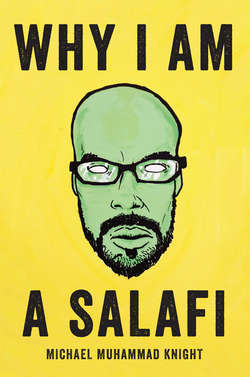Why I Am a Salafi

Реклама. ООО «ЛитРес», ИНН: 7719571260.
Оглавление
Michael Muhammad Knight. Why I Am a Salafi
Отрывок из книги
WHY I AM A SALAFI
2. Return to Pamphlet Islam
.....
The first time that I read the Qur’n, it was a Saudi-networked reprint of Yusuf Ali’s translation, in which editors had purged Ali’s extensive commentary of ideas that they found unacceptable. From there I moved to the seminal Qur’nic commentary of Sayyid Qutb, the Muslim Brotherhood ideologue who was hung by the Egyptian government one year after Malcolm’s assassination. Somewhere in my readings or initial encounters with Muslims, I learned to avoid self-identification as a “convert,” preferring to call myself a “revert”; I had not changed to something new, but had reverted to my original self. Islam had been my condition in the womb, my natural state prior to the interference of culture.
Ideas and practices can dig tunnels under the borders, and not every Sunn who expresses a Salaf-influenced thought would necessarily identify that thought (or herself/himself) as “Salaf.” I would never impose the Salaf label on the mosque at which I formally converted (the Islamic Center of Rochester, New York) or its leadership, but through my experience there, I encountered claims and attitudes that appear in Salaf flows of communication. The imm who witnessed my conversion and became my dearly loved mentor was criticized by some as more philosopher than imm, but he had also been a student of Ism’l al-Farq (1921–1986), a tremendously important scholar who often gets tagged as “Salaf” and/or “Wahhb.” I came to regard al-Farq as part of my Muslim genealogy but had no awareness of the intellectual currents that produced him. Because the books and pamphlets that fell into my hands did not clearly mark themselves as Salaf, and the well-intentioned mosque uncles who shared stories and advice with this young revert did not present their own views as Salaf, it can sometimes become hard to say where Salafism begins and ends, or whether Salafism is even a useful term to explain anything. This is not to play into a particular Islamophobia, specifically a Salafophobia, in which Salaf and/or Wahhb Muslims are portrayed as a sinister fifth column that has clandestinely injected its poison into American Muslim communities. I am not interested in the conspiracy theorists who claim that 80 percent of US mosques have fallen under Wahhb influence, nor the self-appointed voices of moderation who would marginalize Salafism by saying that it accounts for only 3 percent of Sunns. Salafism is not an empirically measurable quantity.
.....